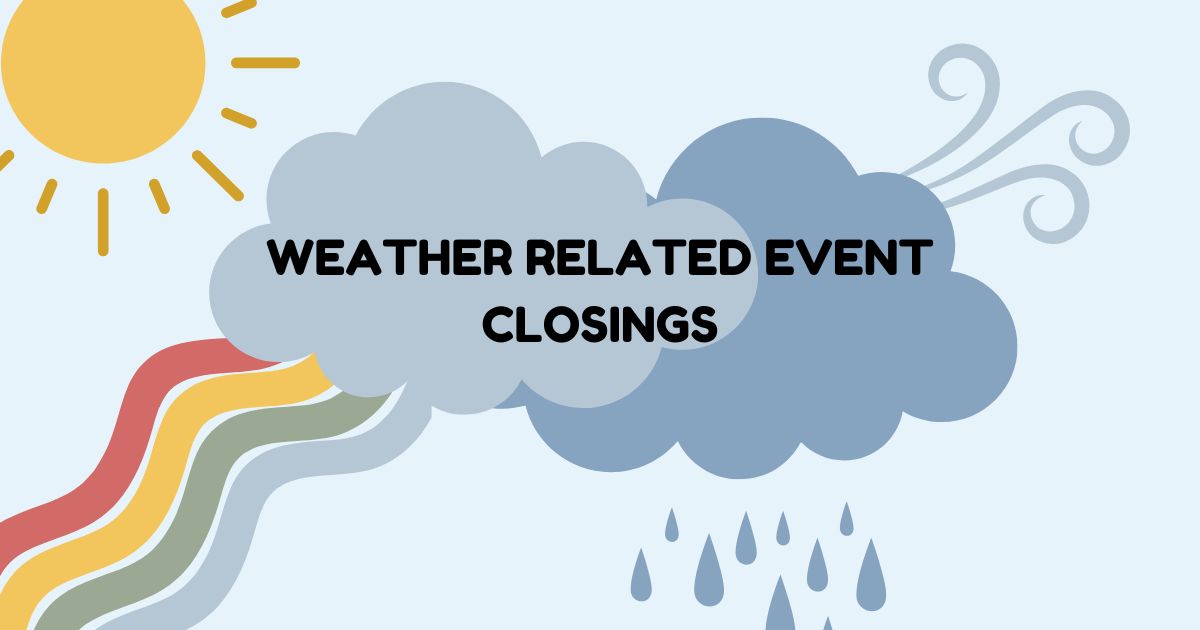Weather-related event closings can cause major disruptions, affecting businesses, schools, and public services. Whether due to extreme storms, heavy snowfall, or dangerous heatwaves, these closures ensure public safety. Understanding their causes, impacts, and how to prepare for them can help minimize inconvenience and risks.
Causes of Weather-Related Event Closings
Severe weather conditions often force event cancellations to protect attendees, employees, and organizers. These include:
Heavy Snow and Ice Storms – Accumulated snow and ice create hazardous road conditions, leading to travel delays and unsafe environments.
Thunderstorms and Lightning – Outdoor events are particularly vulnerable to thunderstorms, as lightning poses significant risks.
Hurricanes and Tornadoes – Strong winds, heavy rainfall, and flying debris make it impossible to conduct events safely.
Extreme Heat or Cold – Prolonged exposure to extreme temperatures can lead to health issues like heatstroke or hypothermia.
Flooding and Heavy Rainfall – Waterlogged streets and infrastructure damage can make travel impossible, forcing closures.
Impact on Schools and Educational Institutions
Schools are among the most affected by weather-related closings. When roads become unsafe, administrators must decide whether to cancel classes. While virtual learning options help, not all students have reliable internet access, leading to learning gaps. Extended closures can also disrupt academic calendars and standardized testing schedules.
Business Disruptions and Economic Effects
Severe weather can halt business operations, especially for retail stores, offices, and factories. Employees may struggle to reach their workplaces, and supply chain disruptions can lead to financial losses. Small businesses, in particular, suffer due to reduced customer traffic and lost revenue from event cancellations.
Public Transportation Challenges
Extreme weather affects bus, train, and airline schedules. Delays and cancellations leave commuters stranded, while icy or flooded roads make driving dangerous. Cities with inadequate infrastructure struggle to maintain public transportation during severe weather, causing widespread inconvenience.
Impact on Public Events and Gatherings
Concerts, sports games, and festivals often get canceled or postponed due to extreme weather. Organizers must consider attendee safety, venue damage, and travel restrictions. These cancellations result in significant financial losses for event planners, ticket holders, and local businesses.
Government and Emergency Response Closures
Government offices and emergency services may also close due to hazardous weather. While essential services like hospitals remain operational, non-emergency government functions may pause. In some cases, emergency shelters open to accommodate displaced individuals.
School and Business Closure Announcements
Timely communication is crucial when announcing weather-related closures. Schools, businesses, and event organizers use various methods, including:
Local News and Radio Stations – Traditional media channels keep the public informed.
Social Media Updates – Quick updates via Twitter, Facebook, or official websites reach large audiences instantly.
Email and Text Alerts – Schools and workplaces notify individuals directly about closures and schedule changes.
Legal and Insurance Considerations
Event cancellations due to weather can involve legal and insurance complications. Contracts between organizers and vendors may include force majeure clauses, protecting them from liability in case of natural disasters. However, refund policies for ticketed events can vary, leading to disputes.
Remote Work and Online Learning Adaptations
The rise of digital technology has reduced the impact of weather-related closings for many businesses and schools. Remote work allows employees to remain productive, while online learning platforms help students continue their education. However, internet outages and power failures remain potential challenges.
Financial Losses from Weather-Related Closures
Event cancellations and business shutdowns lead to substantial financial losses. Affected parties include:
Local Businesses – Restaurants, hotels, and transportation services lose revenue when events are canceled.
Event Organizers – Non-refundable deposits and venue fees add to financial strain.
Hourly Workers – Employees who depend on in-person work suffer wage losses during closures.
Weather Forecasting and Early Warnings
Advanced weather forecasting helps prevent last-minute cancellations. Meteorologists use radar and satellite data to predict extreme weather, allowing event organizers and businesses to plan accordingly. Early warning systems give people time to prepare, reducing risks.
Preparation Strategies for Event Organizers
Organizers can minimize disruptions by implementing the following strategies:
Have a Backup Venue – Indoor alternatives help keep events running in case of bad weather.
Set Clear Refund Policies – Customers should know whether they’ll receive a refund if an event is canceled.
Use Contingency Plans – Establish emergency protocols, including alternative dates and online event options.
Community Support and Recovery After Closures
After a major weather event, communities work together to recover. Local governments provide aid, businesses offer relief services, and volunteers assist those affected. Insurance claims help cover damages, but rebuilding efforts can take time.
Conclusion
Weather-related event closings are a necessary precaution to ensure public safety. While they disrupt daily life, proper planning and communication help minimize their impact. Businesses, schools, and event organizers must stay informed and adapt to changing weather conditions. By leveraging technology and emergency preparedness strategies, communities can better handle these challenges.
FAQs
What are the most common reasons for weather-related event closings?
Heavy snow, thunderstorms, hurricanes, extreme temperatures, and flooding are the most common causes.
How do schools decide when to close due to weather?
School administrators consider road safety, transportation availability, and weather forecasts before making closure decisions.
Can businesses get insurance coverage for weather-related closures?
Yes, business interruption insurance can help cover financial losses due to weather-related shutdowns.
How can event organizers prepare for unexpected weather closures?
They should have contingency plans, alternative venues, and clear refund policies in place.
What role does technology play in minimizing the impact of weather-related closures?
Remote work, online learning, and early warning systems help reduce disruptions and keep people informed.















